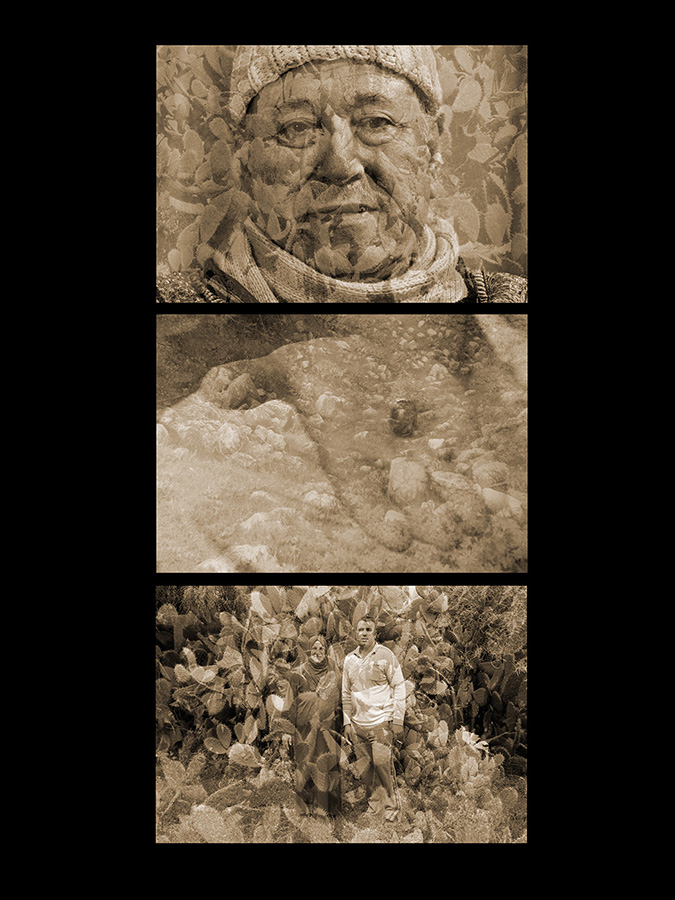| PORTRAITS OF DENIAL & DESIRE Sepia Prints (2014 - Present) |
 |
Hussein Lubani. Digital Print. Sepia. |
Hussein Lubani. Born 1939. El Damoun, Palestine. Lives in Tripoli, Lebanon.
Hussein Lubanin’s appetite for reading, writing and learning, combined with his love for sharing his observations, have guided him from his earliest years to a career as a teacher, author, hakawati (story teller) and cultural historian. His passion for books, poetry, as well as cultural traditions and narratives, have provided him with critical survival tools that enabled him to resist the ongoing cultural genocide that has been inflicted on him, his family and his nation, beginning in 1948. Hussein Lubani was the 9 years old when El Damoun, the agricultural village that his extended family had resided in for numerous generations, was ethnically cleansed by Zionist militia. All of the village’s 1520 inhabitants were forced out of their homes with little but the clothe on their backs. Because the villagers had resisted the expulsion, the village was completely destroyed soon after its occupation. Hussein recalls the confusion and bitter sadness he felt as he was forced to abandon his friends and neighbors, as well as the farm animals that he had lovingly cared for. The world of this studious and perceptive child was turned upside down when his family joined “the sea of humanity” that had been forcibly displaced from their homes and homeland during the catastrophic upheaval that Palestinians refer to as the Nalkba. As the oldest child, he was assigned the task of holding the hand of his blind grandmother and guiding her through the tiny roads and rough unmarked trails, as the family escape the militias while seeking shelter in fields, orchards and villages. For nearly three months, the Lubanis were repeatedly displaced from village to village, as the wave of violent ethnic cleansing rolled like a devastating tsunami across Palestine. “We left barefooted on roads covered with thistles, straw, rocks and stones. We didn’t take established roads, but traveled on rough trails to escape the patrols that would capture us. We traveled in intense heat. It was the end of August. A flamingly hot August… The thing that effected me the most was that I loved school very very much. Because of that, my mother made me a book-bag. A book-bag that she fabricated herself. It had a strap and hung on the side. I had in it the Koran, a book by the late Khalil Sakakini, I also had a science book by Salim Katoul and a couple of my notebooks. I cherished that bag very very much. When I left [El Damoun] I took the bag with me. At that point in our journey we arrived at Sakhnine. Sakhnine was a town that surrendered. We did not surrender... We slept there and were awakened by someone who said that they wanted to capture people whose towns resisted. I ran quickly with my dad and we left everything. I forgot my bag that was hanging on the almond tree. I begged my dad to let me go get it but he was afraid the Jews would capture us. I left without getting my book-bag. I cried for a week or two over the bag... Because of the situation the things that I loved were taken from me… Why did that happen? Why did that happen to us? Why did we have to be punished this unbelievable punishment. My village was lost, my friends the chickens were lost and so were my pigeons and rabbits. I lost my close childhood friend who was killed. I lost my cherished book-bag that had nothing of harm to anyone. I was denied my friends that I played with. Why? Why is that? This is a big thing for the heart of a small boy. It’s a tragedy that’s very very big. A crime that’s very very big. People need to comprehend this and consider the feelings of a child, inflicted with a great punishment that he didn’t deserve.” |
